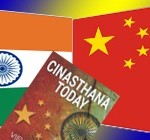India and China can join hands to emerge as “India plus China” rather than “India versus China,” P. S. Deodhar suggests in his recent book, ‘Cinasthana Today: Viewing China from India’. This is an interesting perspective in light of the incursion by the Chinese army in the Depsang area of eastern Ladakh in May this year. The incursion was a shock to policy-makers in India, coming as it did after relatively stable bilateral progress over the past few years; for some, it revived the memories of the war in 1962 between India and China.
The author, a former Electronic Technology Advisor to then Prime Minister Rajiv Gandhi, is currently President of the India-China Economic and Cultural Council in New Delhi. The book is largely based on observations during his numerous travels to China.
Over five sections in the book, Deodhar covers China’s current regional politics as well as the building blocks of Chinese superpower – education and infrastructure – which are very rarely covered by the media or scholars in India. Starting with a broad historical overview, the author then arrives at an account of contemporary China. Of particular significance are the sections on migration to urban China, which portray current social realities in China and the inexorable drive amongst young Chinese to acquire material wealth.
Deodhar suggests that as growing economies, both India and China must forge deeper economic relations to maintain the momentum of growth and make this an Asian century. The spectacular progress made by the Chinese, he says, can be a lesson for India. Both countries can promote greater people-to-people contact and India can learn from China’s development experience and decision-making strategies.
While Deodhar is correct in his assumption that India has a lot of catching up to do, he overstates the potential of cooperation between the two countries. Contrary to what he claims, greater collaboration in the socio-economic and cultural fields is unlikely to translate into closer cooperation between India and China in the political and strategic arenas. The reasons for this are the problem areas he too outlines, such as a festering border dispute, the growing assertiveness of the Chinese military in the Indian Ocean region, China’s “all-weather” relationship with Pakistan, the wide trust deficit between the two militaries, and disputes over water-sharing. All these are only symptoms of the underlying security competition between the two countries.
At various points, Deodhar alludes to the 1962 war and says that it is time for the Chinese leadership to realise the depth of the trauma that conflict caused in Indian minds. However he also claims that the war was an aberration. Unfortunately, historical facts do not support this argument. Since the establishment of the People’s Republic of China in 1949, the Communist party leadership has systematically asserted China’s territorial claims and affirmed its sovereignty and power over Tibet, the South China Sea, East Asia Sea, and the Yellow Sea. China has also tried to claim areas under Indian sovereignty, including Arunachal Pradesh and Sikkim. Viewed in this context, the 1962 war was a carefully-cultivated posture and not an “aberration.”
The author also argues that China’s influence on a weak Pakistan could be useful for India in ensuring regional peace and stability. But India’s actual experience does not support this view. Despite the common threat of terrorism emanating from Pakistan, China remains unconvinced by Indian arguments. Instead, Beijing has chosen to link the issue with the Kashmir dispute and the larger narrative of India-Pakistan relations, even as it has gone about pushing Islamabad to take action against anti-China elements operating from Pakistan.
Despite some of its contentious prescriptions, the book is useful for readers as a comprehensive guide to China, though one that is less analytical and more of a casual read.
‘Cinasthana Today: Viewing China from India’, by P.S. Deodhar. Tata McGraw Hill: 2013, pp 350
Sameer Patil is Associate Fellow, National Security, Ethnic Conflict and Terrorism, at Gateway House.
This article was exclusively written for Gateway House: Indian Council on Global Relations. You can read more exclusive content here.
For interview requests with the author, or for permission to republish, please contact outreach@gatewayhouse.in.
© Copyright 2013 Gateway House: Indian Council on Global Relations. All rights reserved. Any unauthorized copying or reproduction is strictly prohibited.


